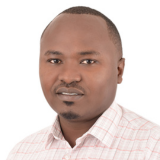Articles
FPAC Profile: Inspired to Become a Business Partner
- By AFP Staff
- Published: 4/14/2023
 In 2017, Alex Mbuthia Karuri, FPAC, attended a finance town hall with Smollan’s Global CFO, where he heard an idea that would change his career trajectory: “As finance, we need to start focusing on how we can add value and transform into business partners.” Alex was inspired. His confidence bolstered, he began the journey to become a business partner.
In 2017, Alex Mbuthia Karuri, FPAC, attended a finance town hall with Smollan’s Global CFO, where he heard an idea that would change his career trajectory: “As finance, we need to start focusing on how we can add value and transform into business partners.” Alex was inspired. His confidence bolstered, he began the journey to become a business partner.
For Alex, it was a journey fueled by self-education. He conducted research and used what he learned about business partnering to create relationships with various stakeholders in the business. “With time I began taking on FP&A duties, referred to as ‘business partnering’ within our company,” he said.
Alex found himself included in such activities as business negotiations, planning, budgeting and forecast development. And soon he was transferred from Kenya to Smollan’s Centre of Excellence in Dubai, United Arab Emirates, where he accepted a role working with the company’s regional and international leadership.
It depends on the season
 As Finance Manager for Smollan, a global sales and marketing services company, Alex said his day-to-day duties depend largely on the season and time of month. At month-end, he is busy coordinating results submissions with the company’s regional teams, collecting and submitting quarterly or annual data results to their Management Information Systems (MIS) teams, or driving a variance investigation and documentation with one of their in-country teams before the month-end close date.
As Finance Manager for Smollan, a global sales and marketing services company, Alex said his day-to-day duties depend largely on the season and time of month. At month-end, he is busy coordinating results submissions with the company’s regional teams, collecting and submitting quarterly or annual data results to their Management Information Systems (MIS) teams, or driving a variance investigation and documentation with one of their in-country teams before the month-end close date.
Roll back to mid-month, and Alex is collaborating with their regional accounting or people teams; driving improvement initiatives on working capital, cashflow or headcount optimization; or assisting the CFO with a board pack for monthly or quarterly review.
Too many organizations are failing to transform
“In order to grow — or even survive — most organizations need to transform into fast-paced, data-driven decision-making organizations,” said Alex. “To do this requires adoption of FP&A as a critical part of the finance organization.” This tops his list as the most critical issue FP&A is facing today because from what he sees, most organizations are stuck in the foundational phase of the FP&A maturity model. “They haven’t even started exploring FP&A,” he said.
Alex sees this as an issue that is occurring most often in mid-size organizations. It is here that “silos are deeply entrenched, data is not democratized to support the practice of FP&A, and systems are looked at as costs rather than investments into building future efficiency,” he said. Whereas larger organizations have realized the potential and value of FP&A and have quickly adopted it. “A great number of them can be classified as having leading practices; they’re already reaping the benefits.”
His advice to fellow finance professionals is to follow his lead in working to sensitize the masses, while also partnering with and anchoring yourself to persons and organizations, such as AFP, that have progressed or benefited from the employment of leading FP&A practices.
Where the future is leading him
In the next couple of years, “I will be looking to dive deeper into strategy, specifically in finance,” said Alex. His passion was renewed for this sector of the finance profession when he was studying for the FPAC exam. In addition to studying and networking with FPAC-certified professionals who are walking that path, Alex is interested in learning more about artificial intelligence and its capabilities.
“There are a lot of developments in regard to AI tools,” he said. “This is an area I want to explore more, especially in terms of how we can improve forecast accuracy and optimize drivers that affect our business.”
Hungry for information about FP&A
In the course of conducting research for a LinkedIn post he was working on, Alex came across a resource titled “The FP&A Maturity Model” by AFP. That was his first interaction with the organization. “By the time I finished the article, they [AFP] had earned my trust as a credible professional society,” he said.
At the point in his career that Alex came across AFP, he was hungry for information, so from there, it wasn’t much of a leap to his decision to earn the FPAC credential.
“The FPAC credential has amplified my ability to have conversations within and outside my organization,” said Alex. “I now have a voice as a subject-matter expert in my field. I’m able to influence decisions on future capital allocation with the confidence that I’m not just giving the best guess, but rather, I am using tried and tested methodologies to bring efficiencies on board and allocate capital efficiently.”
He said he is able to listen confidently to his colleagues without feeling like he has to have all the answers. Instead, he is able to apply a certain way of thinking and working to help solve, innovate and learn collaboratively. Alex said he has also recently been promoted and that more and more FP&A-related requests are coming across his desk. “To me, this is a vote of confidence regarding my skills as an FP&A professional.”
Alex says he recommends the FPAC certification to others for two reasons: the strategic advantage it provides, and the more holistic understanding of decision support he now has within his organization. “I find that when communicating with an internal or external customer, I am able to anticipate their needs and assist them with an appropriate solution or comprehensive analysis,” he said, “because now I understand their business model and the drivers that influence their decision-making more easily, thanks to the FPAC certification.”
Stand out as a strategic business partner with an understanding of the entire business. Get started on your journey to earning the FPAC.
Copyright © 2025 Association for Financial Professionals, Inc.
All rights reserved.

